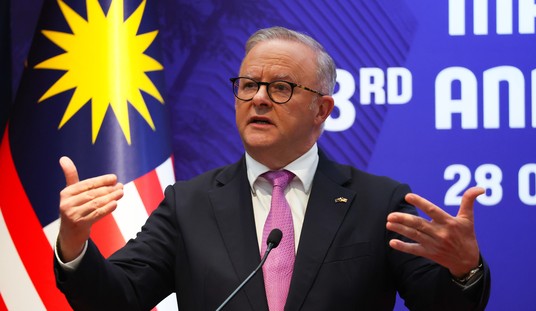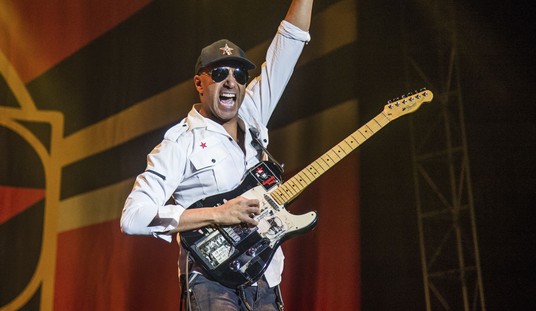In the debate that has erupted on enhanced interrogation techniques since Barack Obama released the OLC memos, we have demanded an honest debate with all of the information on the table. I’ve linked to the CIA standing by its action and the results, Dennis Blair’s memo to Obama (which Obama had redacted to water down) calling the interrogations successful, and Pete Hoekstra’s demand to get the Congressional briefings released to show the approval from key Democrats and Republicans.
To get the whole story, though, everything should be on the table — including personal testimony from a man who was present at some of the interrogations. Ali Soufan represented the FBI in the Abu Zubaydah interrogations, and he objected to it during the interrogations and afterwards as well. Soufan explains that he felt they could get the necessary information from Zubaydah without waterboarding (via Howard Kurtz):
One of the most striking parts of the memos is the false premises on which they are based. The first, dated August 2002, grants authorization to use harsh interrogation techniques on a high-ranking terrorist, Abu Zubaydah, on the grounds that previous methods hadn’t been working. The next three memos cite the successes of those methods as a justification for their continued use.
It is inaccurate, however, to say that Abu Zubaydah had been uncooperative. Along with another F.B.I. agent, and with several C.I.A. officers present, I questioned him from March to June 2002, before the harsh techniques were introduced later in August. Under traditional interrogation methods, he provided us with important actionable intelligence.
We discovered, for example, that Khalid Shaikh Mohammed was the mastermind of the 9/11 attacks. Abu Zubaydah also told us about Jose Padilla, the so-called dirty bomber. This experience fit what I had found throughout my counterterrorism career: traditional interrogation techniques are successful in identifying operatives, uncovering plots and saving lives.
There was no actionable intelligence gained from using enhanced interrogation techniques on Abu Zubaydah that wasn’t, or couldn’t have been, gained from regular tactics. In addition, I saw that using these alternative methods on other terrorists backfired on more than a few occasions — all of which are still classified. The short sightedness behind the use of these techniques ignored the unreliability of the methods, the nature of the threat, the mentality and modus operandi of the terrorists, and due process.
Soufan isn’t exactly a pushover on national security. He blasted former Ambassador to Yemen Barbara K. Bodine, and the Yemeni government in the Washington Post last year, for the former’s lack of support to the FBI team investigating the USS Cole bombing and the latter’s lack of cooperation on counterterrorism. Soufan was one of only eight Arabic speakers in the FBI assigned to counterterrorism, and as such had a ringside seat for some of the most important work done.
Soufan’s column rebuts some of the claims coming from Blair, George Tenet, the CIA, and Dick Cheney. However, most of the claims of success with the waterboarding relates to the interrogation of Khalid Sheikh Mohammed, not Zubaydah, which in itself seems to corroborate Soufan. Apparently, FBI Director Robert Mueller agreed with Soufan, as he withdrew Soufan from the interrogations after Soufan balked at the CIA’s methods. This parallels the FBI’s reaction to the initial interrogations in Guantanamo Bay, which were significantly changed after their internal protest.
Be sure to read the entire column; it’s a worthy entry to the debate from a reliable eyewitness. In my opinion, after reading the Bybee memo, waterboarding should have been avoided altogether unless the interrogators made clear to the subjects that they would not be harmed — as they did with the insect drop. If waterboarding saved lives in Los Angeles and elsewhere, then we need to discuss how many American lives we’re willing to sacrifice to say that we don’t waterboard, but first, we have to know if waterboarding actually saved lives at all.
Update: Tom Maguire does some fact-checking on Soufan:
Ali Soufan, an FBI interrogator of Abu Zubaydah joins the torture debate on the NY Times op-ed page and explains that the Bush era enhanced interrogation techniques were unnecessary and ineffective. Torture doesn’t work, and Mr. Soufan is today’s darling of the reality-based community. However, based on earlier Times reporting and the DoJ Inspector General report Mr. Soufan is, well, misleading us. …
Mr. Soufan says that “I questioned him from March to June 2002, before the harsh techniques were introduced later in August.” As we have seen, something like harsh techniques were already in place. But what happened in July? This high value target of so much attention was left to rock out to the Red Hot Chili Peppers while shivering in his underwear? Probably not. Based on the DoJ IG report the Times story is roughly accurate.
If Mr. Soufan is credible at all then there were divisions within the original CIA team, some members were convinced a tougher approach was warranted, and Bybee was working with them. Or perhaps after the fact some CIA officials involved in the interrogation decided that someone else must have been responsible. CYA at the CIA. Go figure.
Read all of Tom’s post, which is thorough and intriguing.








Join the conversation as a VIP Member